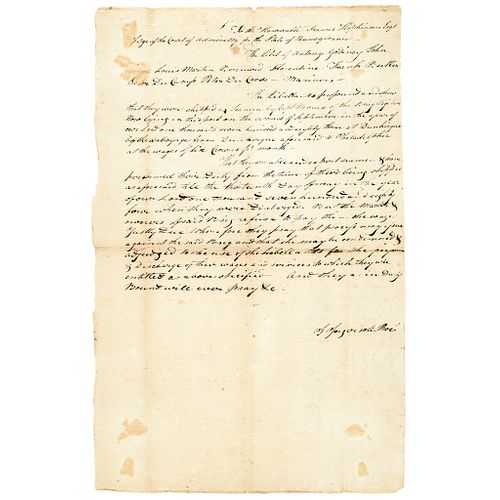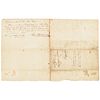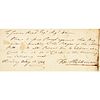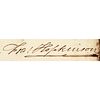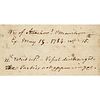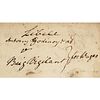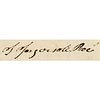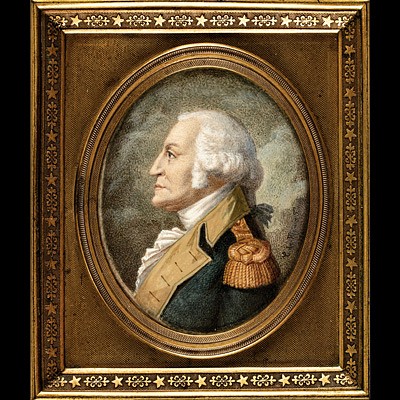FRANCIS HOPKINSON Signer Dec of Inde. + JARED INGERSOLL Signer U.S. Constitution
Lot 33
Estimate:
$1,800 - $2,400
Absentee vs Live bid
Two ways to bid:
- Leave a max absentee bid and the platform will bid on your behalf up to your maximum bid during the live auction.
- Bid live during the auction and your bids will be submitted real-time to the auctioneer.
Bid Increments
| Price | Bid Increment |
|---|---|
| $0 | $10 |
| $200 | $20 |
| $300 | $25 |
| $500 | $50 |
| $1,000 | $100 |
| $2,000 | $200 |
| $3,000 | $250 |
| $5,000 | $500 |
| $10,000 | $1,000 |
| $20,000 | $2,000 |
| $30,000 | $2,500 |
| $50,000 | $5,000 |
| $100,000 | $10,000 |
| $200,000 | $20,000 |
| $300,000 | $25,000 |
| $500,000 | $50,000 |
About Auction
By Early American History Auctions
May 22, 2021
Set Reminder
2021-05-22 12:00:00
2021-05-22 12:00:00
America/New_York
Bidsquare
Bidsquare : Autographs-Colonial-Political-Americana
https://www.bidsquare.com/auctions/early-american-history-auctions/autographs-colonial-political-americana-6913
302 Lots of Rare, Historic Autographs, Americana, Civil War Era, George Washington, Abraham Lincoln, Slavery & Black History, Revolutionary War Era, Colonial America, Federal Period, War of 1812, Colonial Currency, Indian Peace Medals & more... Early American History Auctions auctions@earlyamerican.com
302 Lots of Rare, Historic Autographs, Americana, Civil War Era, George Washington, Abraham Lincoln, Slavery & Black History, Revolutionary War Era, Colonial America, Federal Period, War of 1812, Colonial Currency, Indian Peace Medals & more... Early American History Auctions auctions@earlyamerican.com
- Lot Description
Autographs
Declaration Signer Francis Hopkinson Signed Document as Judge of the Court of Admiralty State of Pennsylvania 1784
FRANCIS HOPKINSON (1737-1791). Signer of the Declaration of Independence, Admiralty Court Judge, Federal Judge, American Author, and primary Designer of the First American Flag and Design of the Great Seal of the United States.
JARED INGERSOLL (1749-1822). Signer of the United States Constitution, Delegate to the Continental Congress (1780-1781).
May 13, 1784-Dated Post Revolutionary War, Autograph Legal Document Endorsement Signed, "Fra Hopkinson" as Judge of the Admiralty Court, and Autograph Legal Document Signed, "J Ingersoll Proc." (prosecutor) on front page legal Document, 2 pages (one sheet, back to back), measuring 10" x 15.5", Pennsylvania, Very Fine. Boldly written in rich brown ink on laid period paper, some expected folds; archivally reinforced folds on the reverse; scattered tone spots. Being a "monition" (a summons in Admiralty cases). Here, Judge Francis Hopkinson of the Admiralty Court of Pennsylvania orders James Read to summon to court Captain Neveux and the owners of the brig Vigilant to respond to the complaint of seven sailors for their wages. The brigantine Vigilant had sailed from Dunkirk to Philadelphia and arrived on March 22. It planned to depart for Guadeloupe late in April, but was likely delayed by this lawsuit. Because the Parties did not appear in court, the owners probably reached an out-of-court settlement with the seven sailors. This historic legal Document reads, in full:
"To the Honourable Francis Hopkinson Esqr Judge of the Court of Admiralty for the State of Pennsylvania --
The Libel of Anthony Godinoy John (Labac) Louis Martin Bernard Florentine Frank Butler Peter Du Camp Peter Du Cross - Mariners --
The Libellants propound and shew that they were shipped as Seamen by Capt Neveux of the Brig Vigilant now lying in this port on the second of September in the year of our Lord one thousand seven hundred and eighty three at Dunkirque by the sea voyage from Dunkirque aforesaid to Philadelphia at the wages of Six Crowns per month.
That they are able and expert Seamen & have performed their Duty from the time of their being shipped as aforesaid till the thirteenth Day of May in the year of our Lord one thousand seven hundred and eighty four when they were Discharged. But the master & owners of said Brig refuse to pay them the wages Justly Due Wherefore they pray that process may issue against the said Brig and that she may be condemned & adjudged to the use of the Libellants for the payment and Discharge of their wages and services to which they are entitled as above specified. And they as in Duty Bound will every pray &c., (Signed) J Ingersoll Proc."
The "monition" on the reverse reads, in full:
"Thursday May 13. 1784 -- To James Read Esqr Reg &c -- Please to issue Process against the Brig Vigilant agreeably to the Prayer of the within Bill & cite all Persons &c to appear at a Court &c at 10 o'Clock in the morning on Saturday next. (Signed) Fra. Hopkinson".
Hopkinson's signature is bold and clear in deep brown with his underscore flourish, measuring a large 3' long and boldly readable being on the top third portion of this Document.
In 1792, Hopkinson published forty-nine of his decisions from the Admiralty Court in the third volume of his Miscellaneous Essays and Occasional Writings. Although this particular legal case was not among those published, approximately one quarter of those Hopkinson included involved seamen who were suing for their unpaid wages.
Hopkinson generally sided with aggrieved sailors, and in Patrick Mahoon et al. v. the Brig Glocester, Hopkinson held that, "Mariners are generally engaged on shore, and always sue for their wages in this court. In the one case the mariners are paid monthly wages, or by the run, in the other by a share of the booty taken. There is the same reason in both cases. But I am of opinion that the articles are not the true foundation of a seaman's claim. If one or more mariners should enter on board a vessel, with the knowledge and consent of the master, should receive his orders and perform the duties of the station, they would be entitled to customary wages, or a proportion of the booty taken in common with the rest of the crew, although they had signed no articles at all, the right is not founded in the articles, but in the service."
After Congress passed the Judiciary Act of 1789, Admiralty jurisdiction transferred to federal district courts rather than state courts.
Our Auction Contents:
Black History & Slavery: (Lots 1 - 63)
Abraham Lincoln Related: (Lots 64 - 74)
Historic Autographs: (Lots 75 - 235)
Colonial America: (Lots 236 - 261)
Revolutionary War: (Lots 262 - 304)
George Washington Related: (Lots 305 - 306)
Early American Guns & Weapons: (Lots 307 - 318) - Shipping Info
-
Early American provides in-house worldwide shipping. Please contact us directly if you have questions about your specific shipping requirements.
-
- Buyer's Premium



 EUR
EUR CAD
CAD AUD
AUD GBP
GBP MXN
MXN HKD
HKD CNY
CNY MYR
MYR SEK
SEK SGD
SGD CHF
CHF THB
THB